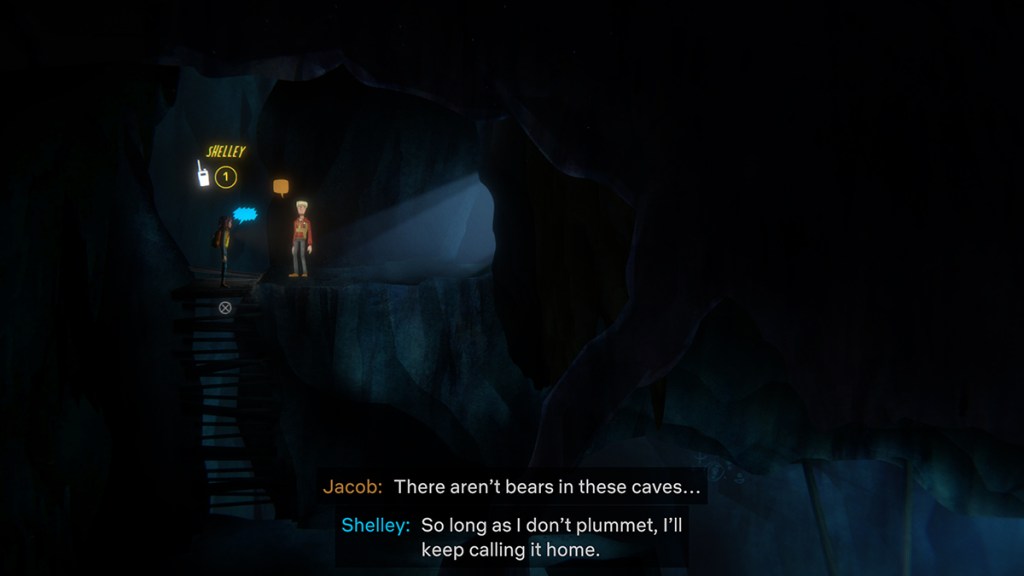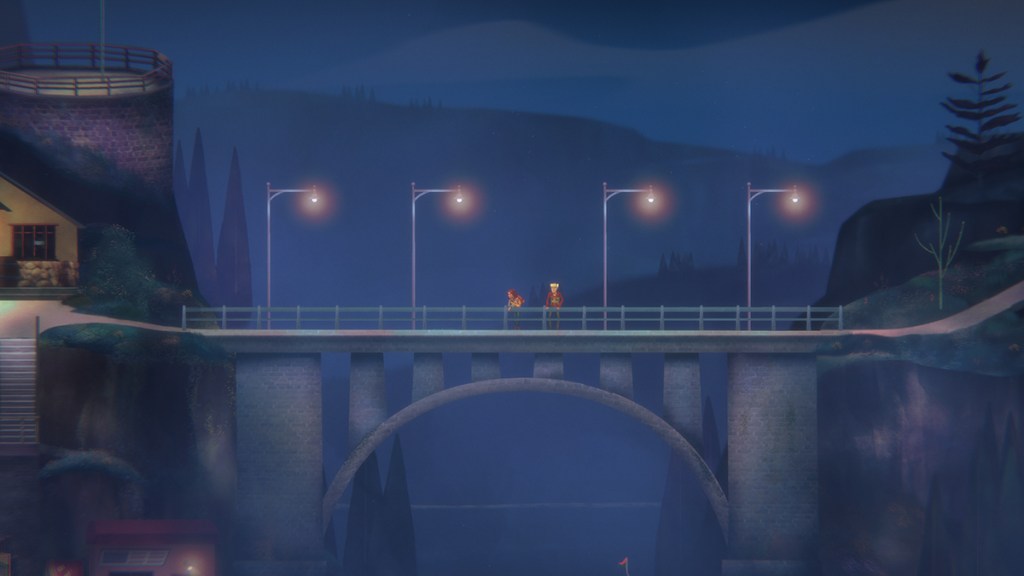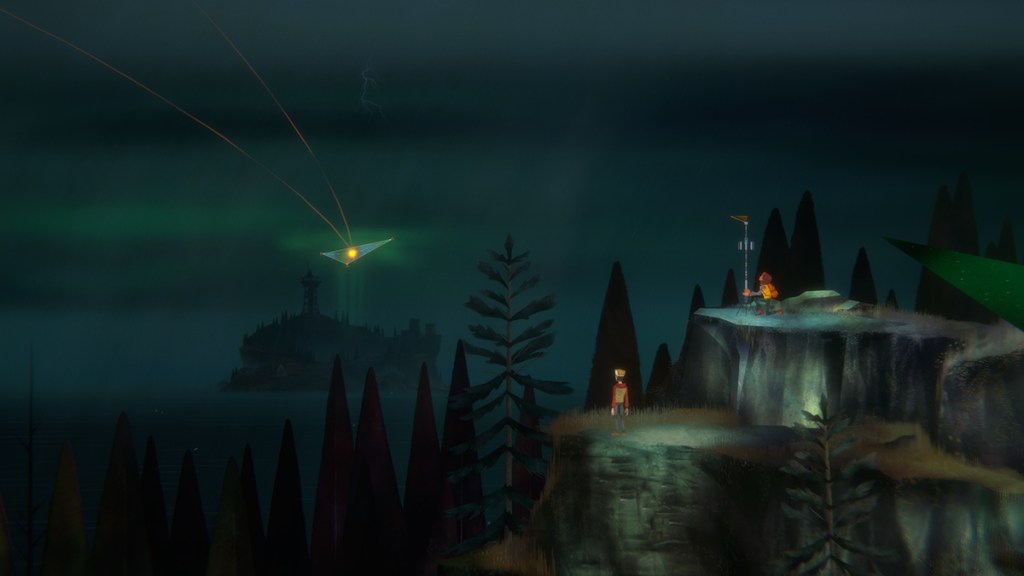[ad_1]
It seemed like Alex was damned to wallow in limbo until the end of time. 2016’s Oxenfree had a dark ending that left its protagonist stuck in a cycle where escape was only a mere fantasy. Oxenfree 2: Lost Signals is the long-anticipated, oft-delayed follow-up poised to offer some sort of closure, and while it does achieve that, it is also trapped in its own loop.
Oxenfree 2 feels like it is repeating itself because it is so similar to the first game. The original was a novel take on the narrative adventure genre since it let players walk and talk at the same time, while utilizing a free-flowing dialogue system that ensured conversations progressed organically. Players weren’t usually doing much, but being able to move to the next story beat while also engaging in conversation was a meaningful iteration on the regimented style of Telltale Games, Supermassive Games, and Quantic Dream.
It’s still an effective way to build character and gives Oxenfree 2 ample opportunity to flesh out its new faces. The way characters speak is also one of its strong suits since they will talk all the way until the player picks a response, meaning conversations don’t have the dead air that is so distracting in many of its contemporaries. The naturalistic performances further ground these characters since they speak with hesitation markers and stammer much like real people without it being a hokey crutch.

All of these small decisions play their part in making Oxenfree 2’s dialogue presentation so impressive, but it’s still the same formula. Night School Studio seemingly didn’t improve or expand these systems to further build on the foundation it laid all those years ago. After seven years, it would have been more enticing if the team pushed forward with some new tweaks or innovations since standards are different now. Oxenfree should have been the starting point, not the endpoint. The walkie talkie that can ping a number of different characters is the most noticeable difference, but those exchanges regularly get interrupted or overlap with other dialogue.
Carrying over the movement system is more detrimental since it drags down the pace and stretches out simple trips. Players can’t even control their walking speed, but it’s almost always too sluggish anyway. Taking a wrong turn is also particularly excruciating since it’s impossible to quickly course correct. Hunting for collectibles or potential secrets only to be met with a dead end is demoralizing and often not worth the effort.
Moving at a snail’s pace curtails the urge to explore and, more broadly, limits replay value. Oxenfree 2 has some hidden conversations and many dialogue choices, but it doesn’t appear to give players many opportunities to truly craft their own playthrough. When so many scenes play out the same way or only have negligible differences, the glacial walking speed and unskippable dialogue just make additional runs even more unappealing. Lengthy and persistent loading times also frequently hinder its forward momentum and are only made somewhat tolerable by its incredible horror-tinged ambient soundtrack.

The pacing seems deliberately dialed down to give players more time to adhere to the cast. Sprinting to the end with a stranger wouldn’t have as much weight as crawling to the climax with a friend. Riley, the protagonist, and her new colleague Jacob are given the space to grow and become more than two-dimensional caricatures simply trying to bust some ghosts.
Riley is laid-back and has a nonchalant attitude that could have become grating, but never does because of its mostly competent (if sometimes overwritten) script. Learning her history and why she’s returned to her hometown are both intriguing hooks that also make her a more nuanced person. Jacob is less complicated and more of an upbeat nerd that hides his staggering amount of insecurity behind humor. His past is not nearly as complicated or compelling, and it seems like his main purpose is to add the levity that Riley is emotionally incapable of providing. It’s bizarre that the game lets players be mean to Jacob since he’s agreeable to a fault — his flaws are internal struggles that aren’t negatively expressed outward — but the two make for a solid team.
Oxenfree 2 uses Riley, Jacob, and the antagonists to comment on acceptance and fate. The ideas are woven together well since they manifest differently in each character and grant alternate viewpoints that all uniquely poke at the game’s themes. While some of those antagonists are faceless ghouls, having a more human opposition with understandable goals offers more subtleties that spooky ghosts aren’t equipped to supply.

These themes are also integral to the plot, which banks too heavily on knowledge from the original game. While it is a sequel, it’s more of a second chapter that demands an intimate familiarity of its forebearer. Despite that requirement, it does a terrible job at recapping those important events by glossing over major beats from the last game and neglecting to properly reintroduce characters. Sequels obviously can and should continue prior storylines and reuse parts of the cast, but it’s crucial for said sequels to give proper context for those elements within themselves; they shouldn’t almost solely depend on prior experience.
And while a clever utilization of New Game Plus, Oxenfree’s canon conclusion is locked behind a few playthroughs that require certain choices. This means Oxenfree 2 is picking up from a finale many likely aren’t familiar with, one that’s radically different from the most commonly seen ending. Given how vital these details are, it’s surprising Night School Studio leaned so hard in this direction without providing a more helpful and thorough synopsis, especially with the lengthy seven-year gap between games.
Oxenfree 2: Lost Signals Review: The final verdict
It seemed like Alex was damned to wallow in limbo until the end of time, but it’s Oxenfree 2 that ended up being caught in a loop. Some of those replicated features work in its favor, like its fluid dialogue and cast of decently well-realized characters, yet it’s too heavily anchored to its predecessor. The aforementioned dialogue system is mostly the same and hasn’t been further streamlined or upgraded. Traversal is still too slow. And even though its narrative builds on what came before, it struggles to provide a comprehensive summary of that first game and contextualize those all-important events. All of these stumbles mean that Oxenfree 2’s signal isn’t lost, just full of unnecessary static.
Naturalistic dialogue and performances both ground the characters
Eerie, yet catchy soundtrack that reinforces its sci-fi horror mood
Doesn’t provide a recap of the original Oxenfree, which is crucial to understanding this game’s story
Too similar to the first game and fails to push forward
Disclaimer: This Oxenfree 2: Lost Signals review is based on a PS4 and PS5 copy provided by the publisher. Reviewed on version 1.02 and 1.002.000, respectively.
[ad_2]
Source link




















